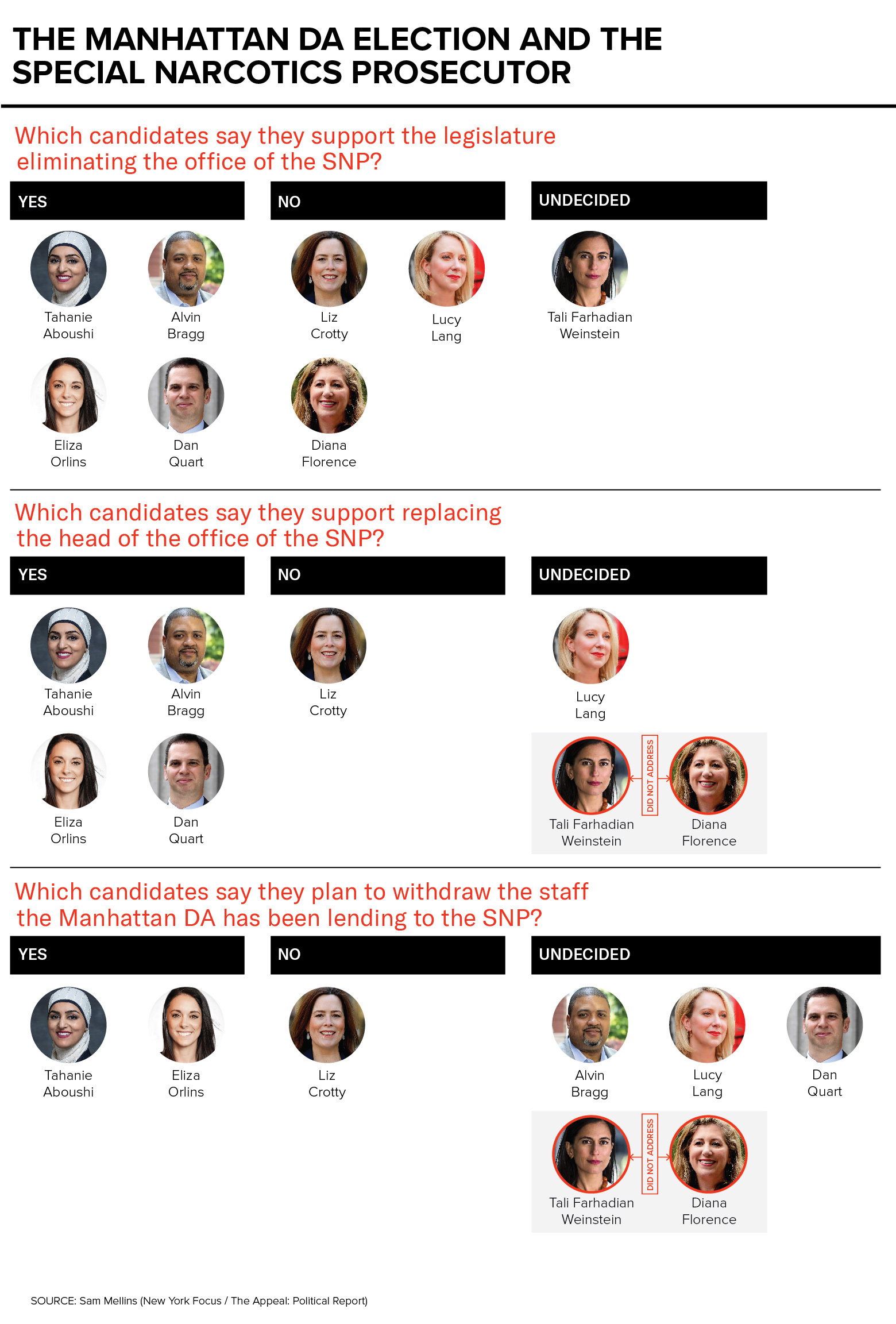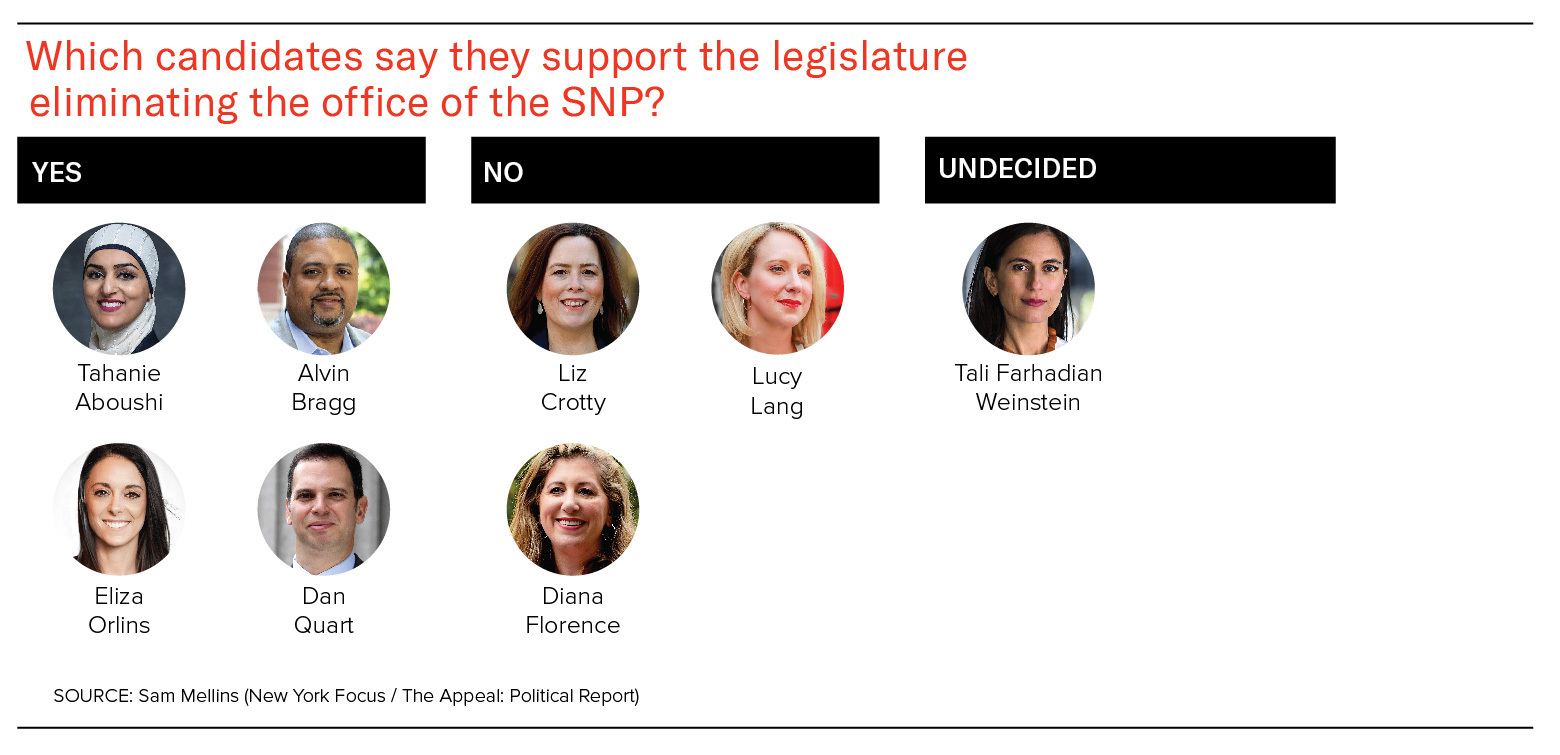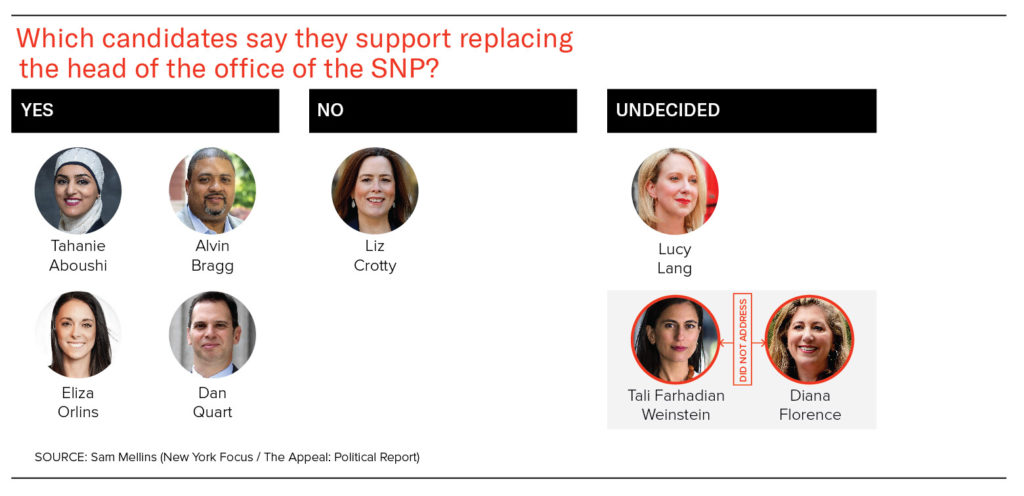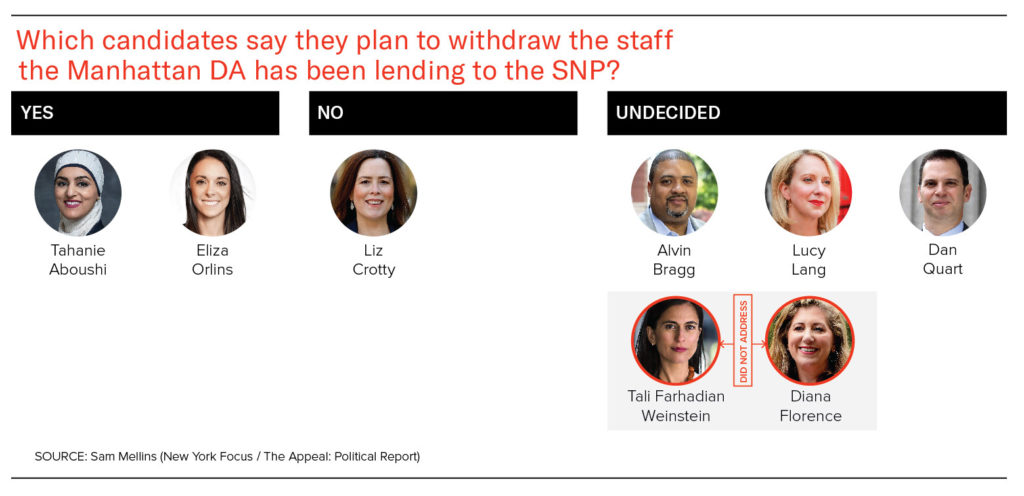The D.A. Election That Could Reshape New York City’s War On Drugs
The office of the Special Narcotics Prosecutor is on the chopping block in Manhattan’s 2021 DA race.

This article is co-published by New York Focus and The Appeal: Political Report, as part of a partnership to cover the 2021 district attorney election in Manhattan.
The war on drugs in New York City is fueled by a little-known but powerful office: the special narcotics prosecutor (SNP), whose powers derive in part from the good will of the Manhattan district attorney’s office.
Manhattan’s election for DA next year could severely curtail the SNP. Some of the candidates in the crowded field vying to replace DA Cy Vance, who has not yet indicated if he will seek re-election, say they would push for abolishing or weakening the office.

The Office of the Special Narcotics Prosecutor was created in 1971 as part of Governor Nelson Rockefeller’s effort to fight the new war on drugs, which also included the infamous 1973 Rockefeller drug laws. Since 2005, the earliest year for which complete records are publicly available, the office has prosecuted over 20,000 individuals and secured thousands of prison or jail sentences.
Unlike the five borough DAs, who deal with a wide variety of cases from white-collar fraud to construction safety, the SNP prosecutes only drug felonies. The SNP is unique to New York City; no other municipality in the country has a prosecutor’s office devoted solely to drug crime.
“All they do are these drug cases day in and day out, and they overcharge. They demand really overly harsh sentences and make horrible offers in cases,” said Tiffany Cabán, a former public defender and Queens DA candidate who is currently running for City Council.
Advocates and defense attorneys are making the case that taking on the SNP is an essential part of fighting mass incarceration in New York.
"Special Narcotics is just stuck in time," Libby Fischer, an attorney with Neighborhood Defender Services, said of the SNP's office, even as some prosecutors' offices nationwide are "starting to change slowly, to come under overdue scrutiny."
Of the eight declared Manhattan DA candidates, all of whom are running in the Democratic primary in June, four told New York Focus and The Appeal: Political Report that they would support legislative reform to abolish the SNP office. Four also said they would vote to remove Bridget Brennan, the tough-on-crime prosecutor who has led the SNP since 1998, fought proposals to reform drug laws, and cultivated a reputation among defense attorneys for pursuing low-level offenses. Brennan could be removed with the approval of three of the five borough DAs.
Perhaps most consequentially, two of the eight candidates—civil rights attorney Tahanie Aboushi and public defender Eliza Orlins—said they would withdraw the 57 assistant district attorneys that the Manhattan DA’s office loans to the SNP. This could be done unilaterally and would cut the SNP’s staff by more than half.
“If the DA pulled their support, the SNP—one of the most horrific vestiges of the Rockefeller drug era—would soon cease to exist,” said Jared Trujillo, president of New York City’s public defenders union.
Vance, the current DA, did not respond to multiple requests for comment on his policies regarding the SNP.
“That’s how you get mass incarceration”
The SNP says it focuses far more on top-level narcotics felonies than lower-grade offenses.
“Of the nearly 2,400 indictments brought by our office between 2017 and 2019, 25% of defendants were charged with top A level felonies. In 2017, the most recent year for which New York State data is readily available, we handled 39% of the state’s most serious narcotics cases,” SNP spokesperson Kati Cornell said in a written statement.
A former prosecutor at the SNP, who spoke on the condition of anonymity because of continued professional involvement with the office, told New York Focus and the Political Report that such statistics can be misleading.
“It’s really about people’s definition of petty crimes. If you think that someone should go to state prison for a couple years for selling two bags of crack because they want to buy new sneakers, then you would agree with [the SNP] that they’re only doing the most serious crimes,” the former prosecutor said. “Those people will end up in prison, and that’s how you get mass incarceration.”
Cornell said that the SNP rarely prosecutes defendants solely for lesser drug possession. “From 2017 to 2019, just 2% of indicted defendants faced lesser narcotics possession charges that do not involve intent to sell, exclud[ing] defendants simultaneously facing non-narcotics charges such as weapon possession, assault and money laundering,” she said.
Fischer said that low figure reflected the SNP’s propensity to charge defendants harshly.
“Somebody could have 10 bags of crack because they’re a heavy user, and SNP will charge them with intent to sell,” Fischer said. “That’s a very common case for us to have to go to trial with. SNP believes if you have more than 20 bucks worth, that means you’re a seller, not a user.”
Orlins, one of the DA candidates and an 11-year public defender, said that many of her clients charged by the SNP were arrested for low-level drug sales in sting operations.
“Time and time again, I would see clients get targeted by undercover officers who would pretend to be addicts themselves,” Orlins said. “They would show up with fake crusted vomit on their sweatshirts, looking disheveled and haggard, and go up to someone who’s a drug user and say, ‘Hey man, hey man, please help me out, I’m so dope sick.’”
“Then the team swoops in, grabs my client off the street, and arrests my client for sales of narcotics to an undercover police officer,” Orlins continued. “All of a sudden this person is facing years in state prison because of this. It is cruel, it is inhumane, it is unjust, it doesn’t make our city safer.”
The former SNP prosecutor said the SNP is out of touch with attitudes in New York. “If you take what the current view of narcotics prosecutions is in this city, people don’t think that someone selling drugs on a corner should go away for four and a half to nine years. But those are the cases that [the SNP] is still doing.”
The SNP cites a commitment to treatment programs as an alternative to incarceration as proof that it is not overly punitive. The unit has had an alternative sentencing bureau since 1992.
“When individuals with substance use disorder are arrested on lower level narcotics sales charges, we are strong proponents for treatment alternatives,” Cornell said.
But records show that few defendants end up getting access to treatment programs. In 2019, just 6 percent of defendants’ cases were diverted to treatment, according to an SNP report. In 2018, the figure was 3 percent.
Asked about these figures, Cornell said that “many defendants currently charged with lower level felonies opt for a probationary sentence rather than entering treatment programs in New York City.”
That’s likely because as burdensome and strict as probation in New York is, treatment programs can be even riskier for defendants.
The SNP typically requires a guilty plea to divert people into treatment programs, Fischer said. And defendants can end up with a less severe plea if they opt for probation instead. “It could be that you’d get a misdemeanor and probation rather than a felony and treatment,” she said.
People who are diverted into treatment programs still face the looming threat of aggressive punishment if they fall short of expectations, which may involve tasks such as finding stable housing and employment.
“If your client relapses, if they mess up in any way, the SNP prosecutors immediately ask for sentencing and incarceration,” Fischer said.
Abolish the SNP?

Janos Marton, an attorney who worked as a criminal justice organizer with the ACLU, was the first DA candidate to publicly advocate abolishing the SNP. He made the issue a pillar of his campaign, releasing a policy paper on it in January, but suspended his campaign earlier this week.
“If you ask most New Yorkers how they feel about the war on drugs, it’s at this point something that we are all ready to move on from,” Marton told New York Focus and The Political Report. “But here we have this office that’s unique to New York that is continuing to perpetuate it in the most regressive ways. Their perspective on the war on drugs is very Republican circa 2010.”
Four candidates still in the field—Aboushi, Orlins, Assemblymember Dan Quart, and former New York Deputy Attorney General Alvin Bragg—told New York Focus and the Political Report that they also support eliminating the SNP.
Bragg added that as DA, he would not actively push to abolish the SNP but instead would focus on ways to “manage the office and improve it” to promote a "public health perspective" on drug issues.
Three candidates—Lucy Lang, Diana Florence, and Liz Crotty, all of whom are former prosecutors—indicated they did not support abolishing the office outright when asked by New York Focus and the Political Report. A fourth, Tali Farhadian Weinstein, said that she is “open to revisiting the question of whether having a separate and interborough office remains the best way to address narcotics cases.”
Lang signaled interest in reforms, saying that “the options aren’t just to shut it down or for things to remain the same” and that she supports “rightsizing it to focus only on high-level trafficking,” while expanding therapy and counseling services and enabling "immediate diversion" of more drug cases to public health programs.
Crotty, who has staked the positions most skeptical of reforms on a range of issues, defended current practices, saying the SNP “provides a vital function in working on complex narcotics cases, investigating large-scale drug enterprises, and combating drug trafficking.”
Asked a number of questions about the SNP, Florence replied in an email statement: “The Special Narcotics Prosecutor should prosecute drug cartels, gun running, drug trafficking rings, and doctors who serve as pill mills, and divert defendants struggling with addiction to treatment.”
Replace Bridget Brennan?
Four of the candidates—Bragg, Orlins, Aboushi, and Quart—told New York Focus and the Political Report that they would vote to replace Brennan as head of the SNP, pointing to her history of supporting a tough-on-crime approach and opposing progressive reforms.
During a 2008 hearing on the reforms to the Rockefeller drug laws that passed the following year, Brennan argued against greater leniency in sentencing. “The threat of incarceration is critical to the success of our programs—and it is a critical element in the success of our efforts to keep dealers from taking over buildings, blocks and neighborhoods," she testified, according to Newsday’s reporting.
Crime rates in New York City, already falling when the reforms were signed, have continued to fall nearly unabated since.
Brennan has also spoken out against other progressive criminal justice reform efforts in New York including safe injection sites, marijuana legalization, and 2019’s bail reform.
“Her thinking just hasn’t evolved since she took office in 1998,” said Trujillo, the New York City public defenders union president.
Bragg argued that Brennan views substance use as an issue of crime rather than public health. “If [the SNP] still exists, prioritizing getting someone in who shares my vision is something I can fully commit to,” Bragg said.
Crotty, by contrast, said that she “knows of no reason to replace Bridget Brennan.”
Lang indicated she had no set position on Brennan. Florence and Weinstein did not address this question when asked over email.
Replacing Brennan would require the support of two of the four other borough DAs, whose offices declined to comment or did not respond to inquiries for this story.
Withdraw attorneys?
The most direct way the Manhattan DA race could affect the SNP office would be its resources: The winner could unilaterally cut its staff by more than half.
As of 2019, 57 of the 72 assistant DAs working in the SNP office—the women and men who prosecute the SNP’s cases—are on the payroll of the Manhattan DA, who could recall them at any time.
Orlins and Aboushi say they would do so if elected.
“The special narcotics prosecutor is a redundant office that targets communities of color, imposes harsher sentences, and has virtually no accountability. I will not cooperate with it or lend ADAs to that office,” Aboushi told New York Focus and the Political Report.
Orlins said she is in favor of recalling assistant DAs “as quickly as possible,” while noting that “it would be difficult to snap my fingers and make it happen. There has to be some transition period.”
Two other candidates expressed interest in the possibility without committing to it. “I would want to know about ongoing cases before saying I'd zero it out on day one, but to be clear, my priorities lie elsewhere,” Bragg said.
Quart said that he would “consider it” but noted that if the Manhattan DA unilaterally withdrew personnel, other DAs could make up the shortfall.
Marton doubts that the other borough DAs would make that choice. “I’ve never heard of an agency saying, ‘It looks like you’re short handed over there, why don’t you take a bunch of our guys,’” he said.
Once again, Lang indicated she did not have a set position on the possibility of withdrawing personnel and Florence and Weinstein did not address the question when asked over email.
Crotty said that she “would oppose at this point recalling ADAs from the SNP office.”
If the next Manhattan DA chose to deplete the SNP’s staff, it would curtail drug prosecutions in New York, advocates say.
“It would be a crucial step toward Manhattan and NYC treating substance use as a public health issue,” Trujillo said, “instead of a vehicle to put Black and brown people in cages.”
Correction: An earlier version of a graphic image in this story inverted the positions of Lucy Lang and Tali Farhadian Weinstein regarding the elimination of the SNP.





